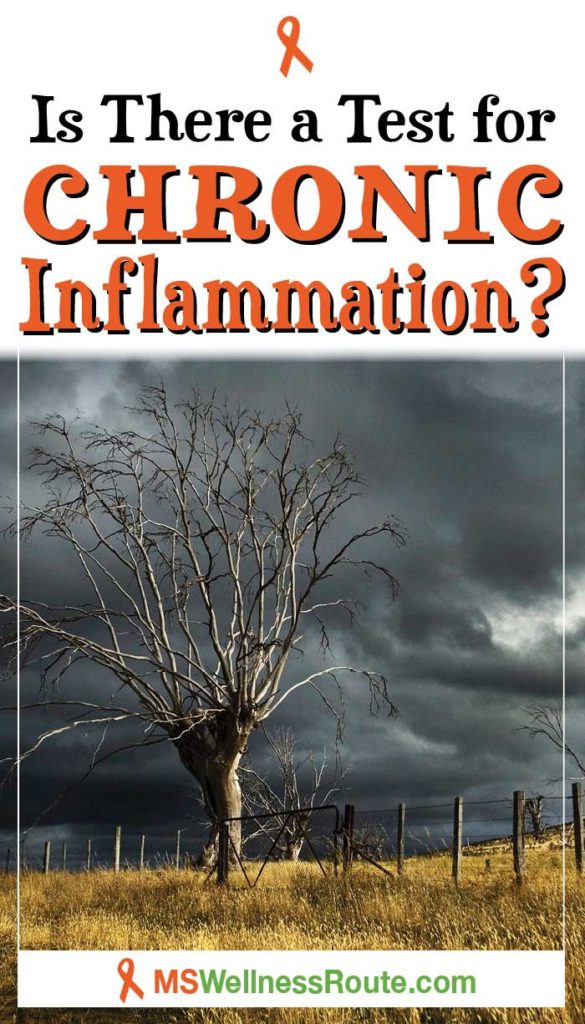Last Updated on November 30, 2023 by Cathy

Inflammation is the body’s defense system. It protects us from bacteria, toxins, injuries, infections, and viruses. It sends us signals such as a fever, pain, redness, or swelling to let us know something is wrong. When the inflammation is constantly there it is considered chronic inflammation. It causes damage to our heart, brain, and other organs. Chronic inflammation is the root cause of almost every major disease.
Diseases associated with chronic inflammation:
- Asthma
- Autoimmune diseases
- Bronchitis
- Cancer
- Chronic pain
- Heart disease
- Stroke
- Type 2 diabetes
Chronic inflammation keeps the body’s tissues from being able to repair properly. It destroys healthy cells throughout the body including organs which leads to disease. Occasional inflammation like a cold is normal. Chronic inflammation leads to serious health issues.
Test for Chronic Inflammation
There are some tests you can get to see how much inflammation you’re dealing with. My functional medicine doctor recommended homocysteine and CRP blood tests. Dr. Terry Wahls also has recommendations in her book The Wahls Protocol.
Homocysteine
Homocysteine is a sulfur-containing amino acid. It’s used by the body in cellular biological processes, it is the manufacturer of protein. When there’s inflammation homocysteine isn’t processing the methylation process.
Homocysteine can also rise due to:
- A poor diet
- Certain medications such as metformin
- Hormone imbalances
- Toxin exposures
- Stress
- Vitamin deficiencies (vitamin B6, vitamin B12, and folate)
High levels of homocysteine are also associated with one or two gene mutations on the methylenetetrahydrofolate reductase (MTHFR) gene. It’s especially common on the variant MTHFR C677T. If you have a mutation on this gene your body isn’t as effective in managing homocysteine.
You can find out if you have an MTHFR gene mutation by ordering a 23and Me DNA Health test kit. Once you have your raw data you’ll need to visit Genetic Genie to see your free methylation and/or detoxification profile.
High levels of homocysteine increase a person’s risk to:
- Autoimmune diseases
- Birth defects
- Cancer
- Diabetes
- Heart attacks
- Stroke
- Neurodegenerative diseases
- Osteoporosis
We can’t change our genetic code. But we can change the expression of our genes. Eating a nutrient-dense diet, relieving toxins, and managing stress will improve your gene expression. Having a normal MTHFR activity is crucial to prevent the rise of homocysteine.
You can get a blood test to find your homocysteine level. A normal range is between 4-15 μmol/L but it’s best to be below 7 μmol/L. As you can see in the picture below mine is at 11 μmol/L.
C-Reactive Protein (CRP)
C-reactive protein (CRP) is a good indicator of inflammation. It’s produced mainly by the liver to protect the body. When there is inflammation the body creates more CRP. But it doesn’t state where the inflammation is coming from or what is causing it.
High levels of CRP is currently linked to:
- Autoimmune diseases
- Brain inflammation
- Cancer
- Chronic fatigue
- Depression
- Diabetes
- Heart disease
- High blood pressure
- Infections
- Stress
- Stroke
A CRP test is another way of testing for inflammation. Like homocysteine the more inflammation there is in the body the higher the level. The American Heart Association recommends a CRP blood test to prevent a heart attack or stroke. People with good cholesterol can still have a heart attack.
Low risk: 1.0 mg/L
Moderate risk: 1-3 mg
High risk: 3 mg
Severe: 10 mg
The image below shows the result of my CRP blood test.
Where to Get Tested
The best place to go to get a blood test for homocysteine or CRP is through your doctor. My insurance wouldn’t pay for my test so I ordered my test using an online lab. I found it was actually cheaper to use an online lab rather than going through my doctor.
It was extremely easy! You order and pay for your test, they provide the doctor’s prescription. You will then receive an email with your lab requisition.
Bring this form to the local lab of your choice for the blood draw. Within a few days, your test results will be emailed to you. I like to use the Health Testing Centers or Walk-In Lab. They oftentimes have different tests on sale so check both sites to see which one works best for you.
How to Reduce Chronic Inflammation
To lower inflammation in your body eat an anti-inflammatory diet. Plus improve your gut health, exercise, get plenty of sleep, and learn to manage your stress.
Before your body can fully heal you need to address any hidden infections, such as:
- Bacterial overgrowth
- Dysbiosis (lack of good gut bacteria)
- Epstein Barr Virus (EBV)
- Environmental toxins
- Heavy metal toxicity
- Leaky gut
- Lyme disease
- Parasites
- Vitamin deficiency
- Yeast overgrowth
Which diet is best?
After one year of strictly following the Wahls Protocol, I didn’t see any improvements. I started looking into what may have triggered my multiple sclerosis (MS). That’s when I realized I had a yeast overgrowth called Candida. After tweaking the Wahls diet I started seeing improvements within three months!
The Wahls Protocol is a nutrient-dense paleo-based diet. Dr. Wahls recommends nine cups of vegetables each day. Including fruit, healthy fats, nuts, seeds, organic meats, organ meats, and seaweed. It’s also important to remove any foods your body is sensitive to.
For candida, I followed the book Healing Multiple Sclerosis by Ann Boroch. Candida feeds off sugar including natural sugars. It’s important to lower your sugar intake and take antifungals to help get candida back under control.
I wanted to stick with the Wahls Protocol since it’s a nutrient-dense diet. But I also needed to get candida under control. So I combined the two diets and it worked! Since everyone is different you need to change your diet to fit YOUR needs.
It’s important to pay attention to your body and get rid of any infections you may have. Infections could include bacteria, parasites, viruses, and yeast overgrowth. If you need help contact a functional medicine doctor to help you get to the root cause.
How to stop chronic inflammation:
- Avoid foods that cause inflammation
- Control blood sugar levels
- Drink plenty of water
- Eat an anti-inflammatory diet
- Exercise
- Get good quality sleep
- Improve your gut health
- Manage stress
- Remove toxins (chemicals, heavy metals, infections, vitamin deficiencies)
Quick Links You May Be Interested In:
What Causes Chronic Inflammation in MS?
What is the Wahls Protocol?
How to Tell if You Have Candida

Quick Guide to Remove Inflammation
Get the password to my library with MANY wellness printables including the Quick Guide to Remove Inflammation here by filling out this form:
Want to remember this health tip? Pin it to your favorite Pinterest board!

Resources
https://www.ncbi.nlm.nih.gov/pmc/articles/PMC5805548/#!po=9.37500







